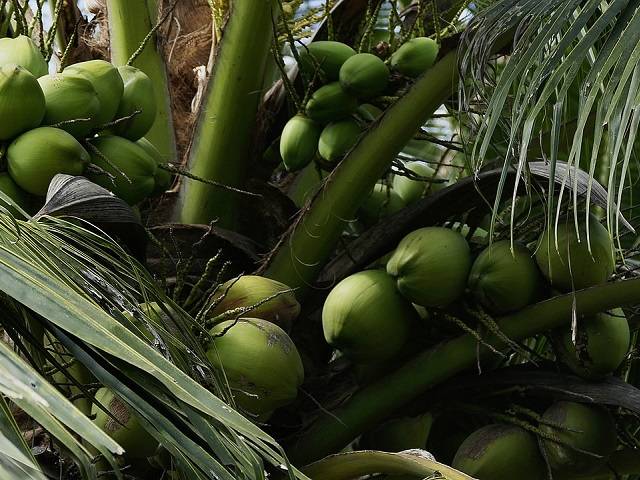
Coconut farming is a booming industry in Ghana, and it holds significant potential for those looking to invest in agriculture. With coconuts increasingly recognized as a profitable cash crop, venturing into coconut farming could yield substantial earnings for aspiring farmers. According to the Food and Agriculture Organization (FAO), a single coconut tree can produce anywhere from 70 to 150 coconuts annually, with an average yield of about 70 to 100. This article will explore the income potential of coconut farming in Ghana, along with insights into starting a farm, anticipated yields, and market opportunities.
Income Potential: Breaking Down the Numbers
Let’s start by exploring the income possibilities based on a hypothetical coconut farm with 1,000 trees. If each of these trees yields 70 coconuts on average, you would be looking at a total annual harvest of 70,000 coconuts.
Given the current market price, a single dry coconut can sell for GHS3.5 to GHS4 or even higher. However, to make our example more conservative, let’s assume you price each coconut at just GHS2. This rate, though lower than the current average, helps create a buffer for market fluctuations and potential losses. At this rate:
Annual Revenue = 70,000 coconuts x GHS2 = GHS140,000
This figure demonstrates how, even with conservative assumptions, coconut farming offers lucrative returns. As you expand your farm or increase yield per tree, the revenue can grow substantially. With time, experience, and the right market conditions, you could be earning far more.
Benefits of Coconut Farming as a Cash Crop
Coconuts are increasingly being recognized as a valuable cash crop for Ghana, with a rising demand both domestically and internationally. My Joy Online highlights that coconuts could become Ghana’s next big export, following in the footsteps of cocoa. This growing recognition underscores why now is a great time to consider investing in coconut farming. Some benefits include:
- High Demand: Coconuts are popular both in local markets and as an export, with applications in food, cosmetics, and more.
- Low Maintenance: Compared to other crops, coconuts are relatively easy to grow and maintain.
- Adaptability: Coconuts can thrive in various climates and soil types, making them suitable for many regions in Ghana.

Given these advantages, coconut farming provides a relatively straightforward way to enter the agricultural industry, with an opportunity to scale your operations over time.
The Costs and Time Investment of Coconut Farming
Starting a coconut farm requires initial investment and patience, as coconut trees take time to mature and bear fruit. However, with proper planning, the potential rewards are worth the wait.
Time to Yield
The time for coconut trees to start producing fruit varies depending on the variety:
- Tall Varieties: Generally take between 6 to 10 years to start bearing fruit.
- Dwarf Varieties: These trees can start yielding coconuts in as little as 4 to 6 years, making them a preferable option for those looking to see a faster return on investment.
Dwarf coconuts are a great choice for new farmers, as they allow for quicker harvests and early income generation.
Getting Started: Key Steps to Establish Your Coconut Farm
Choose Your Land: Coconut trees thrive in tropical environments, so choose land with adequate sunlight and suitable soil. Coastal and sandy soils are often ideal.
Prepare the Land and Seedlings: Clear the land of weeds, and choose high-quality seedlings for planting. The health of your seedlings will influence the yield of each tree.
Planting and Spacing: Coconut trees need sufficient space to grow. For optimal results, plant each tree 8-10 meters apart.
Regular Maintenance: While coconuts are low-maintenance, regular watering, pruning, and fertilizer application can help maximize yield.
Harvesting and Selling: Once the trees start bearing coconuts, harvest them carefully to prevent damage. You can then sell your coconuts locally, to wholesalers, or even explore exporting as demand grows.
Expanding Your Income Potential: Beyond Selling Coconuts
With a coconut farm, you’re not limited to selling just the coconuts. Other income-generating opportunities include:
Coconut Oil Production: Coconut oil is in high demand for cooking, skincare, and haircare. By investing in processing equipment, you can add value to your coconuts and sell coconut oil for a higher profit margin.
Coconut Water: The refreshing water inside young coconuts is a popular beverage with health benefits. If you focus on harvesting younger coconuts, you can tap into this market.
Coir and Shell Products: Coconut shells and husks can be used to make various products, such as ropes, mats, and charcoal. These by-products can serve as an additional revenue stream.
Coconut Farming in Ghana: The Path to a Sustainable Business
The coconut industry in Ghana is set for growth, with local and international demand on the rise. As more consumers turn to coconuts for health, beauty, and culinary uses, the opportunities for farmers will only increase. For aspiring agricultural entrepreneurs, coconut farming presents a way to build a sustainable, high-revenue business with relatively low maintenance.
Moreover, with global shifts toward natural and organic products, coconuts fit right into these trends. By starting a coconut farm today, you can contribute to Ghana’s economic growth while building a rewarding, profitable business for yourself.

Final Thoughts
Coconut farming may require some upfront effort and patience, but it’s a venture with promising financial returns. With 1,000 coconut trees, you could be earning an estimated GHS140,000 annually by selling your coconuts at just GHS2 per nut. As you scale up, optimize your yield, and explore alternative revenue streams, your income potential only grows.
For Ghanaian entrepreneurs looking to enter agriculture, coconut farming is an excellent opportunity. Consider the possibilities, start small, and grow your farm with time. As Napoleon Hill famously said, "Whatever the mind can conceive and believe, it can achieve." The future of coconut farming in Ghana is bright—now is the time to plant the seeds of your success.
 blogpay
blogpay


























Total Comments: 0